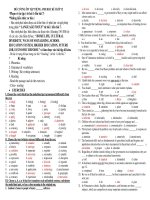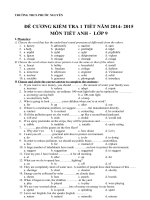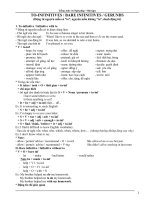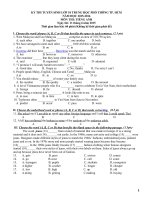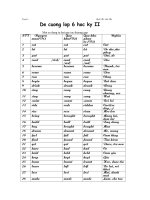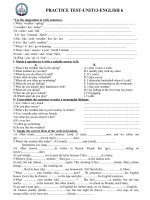ĐỀ CƯƠNG ôn tập TIẾNG ANH lớp 12
Bạn đang xem bản rút gọn của tài liệu. Xem và tải ngay bản đầy đủ của tài liệu tại đây (108.66 KB, 6 trang )
ĐỀ CƯƠNG ÔN TẬP TIẾNG ANH LỚP 12
I. Choose the word which has the underlined part pronounced differently from the rest.
1. a. naked b. looked c. booked d. hooked
2. a. share b. rare c. are d. declare
3. a. cooks b. loves c. joins d. spends
4. a. hurry b. under c. pressure d. rush
5. a. apply b. university c. identity d. early
6. a. choice b. achieve c. each d. chemistry
7. a. final b. applicant c. high d. decide
8. a. economy b. industry c. qualify d. priority
9. a. measure b. subsidies c. domestic d. hospital
10. a. though b. encourage c. enough d. country
II. Choose the word which is stressed differently from the rest.
1. a. partnership b. romantic c. actually d. attitude
2. a. believe b. marriage c. response d. maintain
3. a. confident b. important c. together d. exciting
4. a. possible. b. university c. secondary d. suitable
5. a. expression b. easily c. depression d. disruptive
6. a. typical b. favorite c. division d. organize
7. a. computer b. establish c. business d. remember
8. a. university b. application c. technology d. entertainment
9. a. certificate b. necessary c. economy d. geography
10. a. economy b. experience c. relationship d. renovation
III. Choose a, b, c, or d that best completes each unfinished sentence, substitutes the underlined part, or has
a close meaning to the original one.
1. London is home to people of many _______ cultures.
a. diverse b. diversity c. diversify d. diversification
2. John cannot make a _______ to get married to Mary or stay single until he can afford a house and a car.
a. decide b. decision c. decisive d. decisively
3. It is thought that traditional marriage _______ are important basis of limiting divorce rates.
a. appearances b. records c. responses d. values
5. Billy has been seriously ill, and he was taken to _____ hospital yesterday
a. a b. an c. the d. Ø
6. You should not burn _______. You had better dig a hole and bury it.
a. dishes b. lab c. garbage d. shift
7. He was very respectful at home and _______ to his parents.
a. responsible b. caring c. obedient d. lovely
8. One of Vietnamese traditions is a belief in _______ families and in preserving their cultures.
a. wealthy b. secure c. safe d. close-knit
9. He was _______ when I had those problems and said whatever I did he would stand by me.
a. supportive b. exciting c. busy d. dull
10. I didn't think his comments were very appropriate at the time.
a. correct b. right c. exact d. suitable
11. You should _______ more attention to what your teacher explains.
a. make b. get c. set d. pay
12. Our teacher often said, "Who knows the answer? _______ your hand."
a. Rise b. Lift c. Raise d. Heighten
13. This is the instance where big, obvious non-verbal signals are appropriate.
a. situation. B. attention c. place d. matter
14. They started, as _______ gatherings but they have become increasingly formalized in the last few years.
a. informal b. informally c. informalize d. informality
15. Children who are isolated and lonely seem to have poor language and …
a. communicate b. communication
c. communicative d. communicator
16. The lecturer explained the problem very clearly and is always _______ in response to questions.
a. attention b. attentive c. attentively d. attentiveness
1
17. The functional skills such as fundamentals of agriculture, health and hygiene and population education have
also been incorporated in the primary school _______.
a. curriculum b. project c. plan d. schedule
18. Regardless of whether schools belong to the government or are independent, they are …… to adhere to the
same curriculum frameworks.
a. told b. required c. demanded d. taken
19. In Scotland, students transfer from primary to secondary education at approximately age 12.
a. compound b. base c. change d. move
20. He was so ill that he could not _______ his final examination and cancelled it to the next year.
a. make b. do c. take d. gain
21. In Vietnamese schools, English, mathematics, and literature are three _______ subjects, which are compulsory
in many important national examinations.
a. core b. part c. center d. middle
22. For more than 20 years, the Vietnamese government has pursued the open-door _______ and continued to woo
foreign investment.
a. policy b. way c. export d. guideline
23. After a decade of economic liberalization, Vietnam has seen a dramatic rise in living _______ in urban areas.
a. surface b. standards c. levels d. backgrounds
24. _______ laws and regulations which impose restrictions on any rights should be revised to comply with
international law.
a. Domestic b. Program c. Encouraged d. Expanding
25. These new economic reforms have allowed for international _______ and development in the country.
a. pay b. renovation c. investment d. opportunity
26. The number of the participants in the survey _______ 250 students for Oxford University.
a. are b. was c. were d. have been
27. The grass was yellow because it _______ all summer.
a. does not rain b. has not rained c. had not rained d. would not rain
28. Many people even wonder these days _______.
a. what marriage is b. what is marriage
c. what marriage was d. what was marriage
29. The lights _______ out because we _______ the electricity bill.
a. have gone / did not pay b. will go / did not paid
c. go / would not pay d. went / had not paid
30. _______ Tom Cruise's last movie? Yes, I _______ it three days ago
a. Have you ever seen / saw b. Did you ever see / have seen
c. Had you ever seen / would see d. Will you ever see / saw
31. In the past, people _______ to the beach more often.
a. have gone b. used to go c. were going d. had gone
32. Soon, people _______ most of the time at home.
a. will work b. are working c. have worked d. work
33. I _______ a terrible accident while I _______ on the beach.
a. see / am walking b. saw / was walking
c. was seeing / walked d. have seen / were walking
34. After all, she _______ him since her childhood.
a. knows b. knew c. was knowing d. had known
35. We _______ touch since we _______ school three years ago.
a. lost / have left b. have lost / leave
c. have lost / left d. were losing / had left
36. In the 19th century, it _______ two or three months to cross North America by covered wagon.
a. took b. had taken c. had taken d. was taking
37. In the past the trip _______ very rough and often dangerous, but things _______ a great deal in the last
hundred and fifty years.
a. was / have changed b. is / change
c. had been / will change d. has been / changed
38. Now you _______ from New York to Los Angeles in a matter of hours.
a. are flying b. would fly c. will fly d. can fly
39. When Carol _______ last night, I ______ my favorite show on television.
2
a. was calling / watched b. called / have watched
c. called / was watching d. had called / watched
40. By this time next summer, you _______ your studies.
a. completes b. will complete c. are completing d. will have completed
41. Last night at this time, they … the same thing. She… and he … the Newspaper.
a. are doing / is cooking / is reading
b. were doing / was cooking / was reading
c. was doing / has cooked / is reading
d. had done / was cooking /read
42. When I … home last night, I … that Jane a beautiful candlelight dinner.
a. had arrived / discovered / prepared
b. was arriving / had discovered / was preparing
c. have arrived / was discovering / had prepared
d. arrived / discovered / was preparing
43. Peter said that he had lived in London four years _______.
a. ago b. before c. later d. then
44. The guest told the host that _______.
a. I must go now b. he must go now
c. he had to go now d. he had to go then
45. The teacher told Joe _______.
a. to stop talking b. stop talking c. stops talking d. stopped talking
46. She said she _______.
a. was very tired last night b. was very tired the night before
c. had been very tired last night d. had been very tired the night before
47. Emily said that her teacher _______ to London _______.
a. will go / tomorrow b. went / tomorrow
c. would go / the next day d. had gone / the next day
48. She told the boys _______ on the grass.
a. do not play b. did not play c. not playing d. not to play
49. She asked _______.
a. where was her umbrella b. where her umbrella was
c. where were her umbrella d. where her umbrella were
50. Jason asked me _______ me the book the day before.
a. if who gave b. if who has given
c. who had given d. that who had given
51. Robert said that his father _______ to Dallas the year before.
a. goes b. went c. has gone d. had gone
52. He wanted to know _______ shopping during the previous morning.
a. if we had been going b. that if we had been going
c. we were going d. that we were going
53. _______ by the police.
a. The stealing car has just been found b. The stolen car has just been found
c. The stealing car has just found d. The stolen car has just found.
54. _______ students required to wear uniforms at all times?
a. Are b. Do c. Did d. Will
55. _______ to you yet?
a. Are the book been giving back b. Was the book been given back
c. Has been the book given back d. Has the book been given back
56. What he has done to me _______.
a. cannot forgiven b. cannot be forgiven
c. cannot forgive d. cannot be forgiving
57. The keys _______ somewhere.
a. must have been leaving b. must have left
c. must be leaving d. must have been left
58. Japanese _______ at the meeting.
a. will speak b. will spoken c. will be spoken d. will be speaking
59. Although he tried his best, he could not make his voice _______.
3
a. hear b. to hear c. hearing d. heard
60. I _______ in the lounge for ten minutes.
a. was told waiting b. was told to wait
c. was telling to be waited d. was told to be waited
61. These students _______ so much that they feel very tired and bored.
a. are made to study b. are made study
c. are making to study d. ate made to be studied
62. They _______ time and money doing such a thing.
a. were advised not to waste b. were advised not to be wasted
c. were advising not to waste d. were advising not to be wasted
63. We'll need more staff _______ we start the new project.
a. unless b. whether c. in case d. or
64. If I _______ 10 years younger, I _______ the job.
a. am / will take b. was / have taken
c. had been / will have taken d. were / would take
65. _______ I had learnt English when I was at high school.
a. Unless b. Even if c. If d. If only
66. You are not allowed to use the club's facilities _____ you are a member.
a. unless b. if c. provided d. supposed
67. If she _______ the train last night, she here now.
a. took / were b. were taking / is
c. had taken / would have been d. had taken / would be
68. _______ if a war happened?
a. What you would do b. What would you do
c. What will you do d. What will you do
69. I would send her a fax if I _______ her number.
a. know b. knew c. had known d. could know
70. _______ it were well paid, I would accept this proposal.
a. Providing b. Unless c. But for d. If only
71. The children slept well, despite _______.
a. it was noise b. the noise c. of the noise d. noisy
72. She left him _______ she still loved him.
a. even if b. even though c. in spite of d. despite
73. _______ her lack of hard work, she was promoted.
a. In spite b. Even though c. In spite of d. Despite of
74. _______ they are brothers, they do not look like.
a. Although b. Even c. Despite d. In spite of
75. We are concerned with the problem of energy resources _______ we must also think of our environment.
a. despite b. though c. as though d. but
76. _______ some Japanese women are successful in business, the majority of Japanese companies are run by
men.
a. But b. Even if c. If d. As though
IV. Choose the sentence which has the closest meaning to the original one or choose the best sentence that can
be arranged from the words given.
1. "How beautiful is the dress you have just bought!" Peter said to Mary.
a. Peter promised to buy Mary a beautiful dress.
b. Peter said thanks to Mary for her beautiful dress.
c. Peter complimented Mary on her beautiful dress.
d. Peter asked Mary how she had just bought her beautiful dress.
2. "Hello, Mary!" Peter said. ' a. Peter said hello Mary. b. Peter said Mary hello.
c. Peter told Mary hello d. Peter greeted Mary.
3. Julie and Anne had not met each other before he party.
a. Julie and Anne got acquainted when they were at the party.
b. The party prevented Julie and Anne from meeting each other.
c. The party was the place where Julie and Anne could not meet each other.
d. Julie and Anne used to meet each other for the party.
4. "Why don't you ask the teacher for help?" Peter asked me.
4
a. Peter advised me to ask the teacher for help.
b. Peter recommended me not to ask the teacher for help. ,
c. Peter told me the reason why I did not ask the teacher for help.
d. Peter suggested that he should ask the teacher for help.
5. our I will /school / if /access / much/ Internet /we /to /learn/ the/
better / has
a. If our school has access to the Internet, we will learn much better.
b. If we will learn much better, our school has access to the Internet.
c. If our school has much access, we will learn better to the Internet.
d. If we will learn better to the Internet, our school has much access.
6. exchange / allows / computers / and / us / to / the / ideas / connect / to / !other / Internet
a. The Internet allows us to connect to other computers and exchange ideas.
b. The Internet exchange ideas and allows us to connect to other computers.
c. The Internet allows us and exchange ideas to connect to other computers.
d. The Internet connect to other c9mputers and allows us to exchange ideas.
7. The man suddenly realized that the neighbor was watching him.
a. The man suddenly realized that he was -being watched by the neighbor.
b. The neighbor was watching the man and he suddenly realized that.
c. The neighbor was suddenly realized the man and watching him.
d. The man suddenly realized that he was watched by the neighbor.
8. If only I had studied hard enough to pass the final exam.
a. I regret not studying hard enough to pass the final exam.
b. I had studied hard enough and I passed the final exam.
c. I studied too hard to pass the final exam.
d. I studied hard otherwise I would fail the final exam.
9. John speaks Chinese fluently because he used to live in China for ten years.
a. Suppose John has lived in China for ten years, he can speak Chinese fluently.
b. Provided that John lived in China for ten years, he could speak Chinese fluently.
c. Unless John had lived in China for ten years, he could not have spoken Chinese fluently.
d. John could not speak Chinese fluently if he had not lived in China for ten years.
10. Although sales fell sharply last month , we are on target for the year.
a. Even though felling sharply in sales last month
b. In spite of there was a sharp fall in sales last month
c. Despite the sharp fall in sales last month
d. Even if falling sharply in sales last month.
11. Despite the increase in their salaries , 60 per cent of Japanese workers still spend Saturday at work.
a. In spite of their salaries are increased
b. Although they has got the increase in their salaries
c. As their salaries have been increased
d. Even though their increasing salary
V. READING
A/ Read the two passages carefully and choose the correct answer.
In developing countries, people are sometimes unaware of the importance of education, and there is economic
pressure from those parents who prioritize their children's, making money in the short term over any long-term
benefits of education. Recent studies on child labor and, poverty have suggested that when poor families reach a
certain economic threshold where families are able to provide for their basic needs, parents return their children to
school. This has been found to be true, once the threshold has been breached, even if the potential economic value
of the children's work has increased since their return to school.
Other problems are that teachers are often paid less than other professions; a lack of good universities and a
low acceptance rate for good universities are evident in countries with a relatively high population density.
India has launched EDUSAT, an education satellite that can reach remote parts of the country at a greatly
reduced cost. There is also ail initiative supported by several major corporations to develop a $100 laptop. The
laptops have been available since 2007. The laptops, sold at cost, will enable developing countries to give their
children a digital education. In Africa, an "e-school program" has been launched to provide all 600,000 primary
and high schools with computer equipment, learning materials and internet access within 10 years. Volunteer
groups are working to give more individuals opportunity to receive education in developing countries through
such programs as the Perpetual Education Fund. An International Development Agency project started with the
5
support of American President Bill Clinton uses the Internet to allow co-operation by individuals on issues of
social development.
1. In developing countries, ________.
a. people all know that education is very important all the time
b. all parents are rich enough to send their children to school
c. children have rights to get high schooling
d. children have to work instead of going to school
2. According to recent studies, when parents are able to overcome their financial difficulty, ________.
a. they send their children back to school
b. they still make their children continue working
c. they have their children work even harder
d. they themselves continue their schooling
3. In populous countries, ________.
a. teaching is the highest-paid career
b. there are a lot of good universities
c. there is a lack of good universities
d. no other careers are better paid than teaching
4. The third paragraph is about ________.
a. an Indian education satellite
b. the projects to computerize education in developing countries
c. the computerization of African education
d. President Bill Clinton who bought a lot of computers
5. How many projects are presented in the third paragraph?
a. One b. Two c. Three d. Four
B/ Fill in each numbered blank with one suitable word or phrase.
The General Certificate of Secondary Education or the GCSE examinations for (1) _____ are the standard
school-leaver qualifications taken by (2) _____ all UK students in the May and June following their 16th birthday.
If you come to a UK (3) _____ school before you (4) _____ the age of 16, you will study towards GCSE
examinations in up to 12 subjects. Some subjects are compulsory, including English arid mathematics, and you
can select (5) _____, such as music, drama, geography and history from a series of options. GCSEs provide a good
all-round education (6) _____ you can build on at college and eventually at university.
AS- and A-levels are taken after GCSEs. They are the UK qualifications most (7) _____ accepted for entry to
university and are available in subjects from the humanities, arts, sciences and social sciences as well as in (8)
_____ subjects such as engineering, and leisure and tourism. You can study up to four subjects at (9) _____ same
time for two years, (10) _____ AS-level examinations at the end of your first year (called the lower-sixth) and A-
level qualifications at the end of your second year (called the upper-sixth).
1. a. short b. long c. big d. long
2. a. similarly b. fortunately c. approximately d. virtually
3. a. dependence b. independence c. independent d. independently
4. a. reach b. come c. approach d. go
5. a. other b. each other c. another d. others
6. a. what b. that c. where d. whose
7. a. wide b. widely c. width d. widen
8. a. practical b. apprentice c. vocational d. physical
9. a. a b. an c. the d. Ø
10. a. holding b. choosing c. putting d. taking
6


